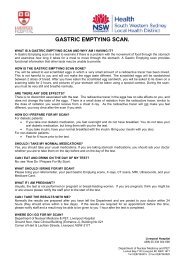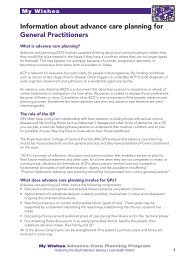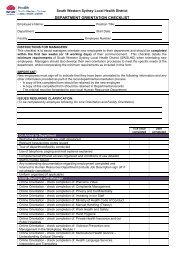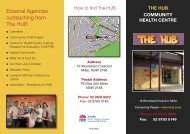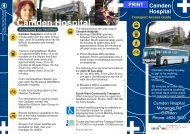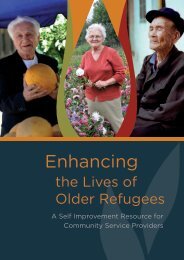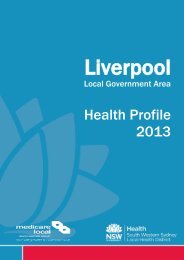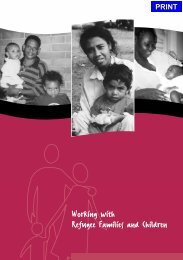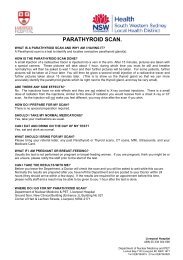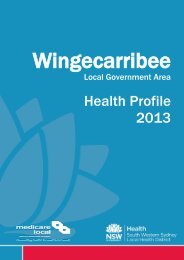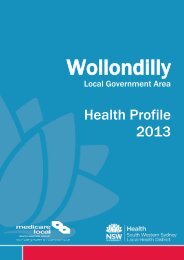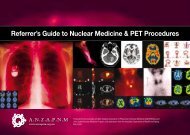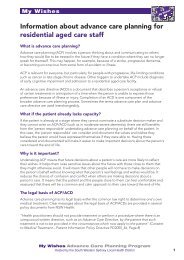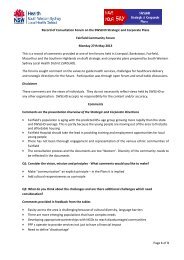Issues Paper - South Western Sydney Local Health District - NSW ...
Issues Paper - South Western Sydney Local Health District - NSW ...
Issues Paper - South Western Sydney Local Health District - NSW ...
Create successful ePaper yourself
Turn your PDF publications into a flip-book with our unique Google optimized e-Paper software.
A Research Strategy for <strong>South</strong> <strong>Western</strong> <strong>Sydney</strong> <strong>Local</strong> <strong>Health</strong> <strong>District</strong> – <strong>Paper</strong> No.1 <strong>Issues</strong> Final April 2012effectiveness; building on GP related research; the impact of colonisation and forcedseparation of families on health; and care planning.People from Culturally and Linguistically Diverse (CALD) CommunitiesThere are pockets of CALD research in the <strong>District</strong> covering research topics such as refugeehealth, violence, and specific health treatment e.g. orthopaedics. However despite the sizeof the CALD communities, concerns were expressed that clinical research often excludespeople who do not speak English (usually citing interpreter costs), limiting the pool ofresearch candidates and potentially restricting generalisation of findings across all residents.In addition, little attention is given to communities with health problems at rates higher thanthe <strong>NSW</strong> average. Inadequate consideration of cultural factors such as literacy, communityinexperience with research and concerns about confidentially further inhibit participation.Belated involvement of multicultural expertise and insufficient consideration of communityexpectations were also seen to impact on future involvement in research and relationshipswith service providers.<strong>Health</strong> professionals have recognised for decades that health care for people from CALDbackgrounds requires additional effort and resourcing. A strategic concern for this <strong>District</strong> isthat activity based funding does not adequately consider these additional costs. It is in the<strong>District</strong>’s interest to undertake health services research to identify how health care to thesecommunities can be provided efficiently into the future.It also in the <strong>District</strong>’s interest to focus more strongly on those health conditions which are atlevels above the state-average given their potential to substantially increase demand forhospital based services. It also creates the potential to develop commercial and populationapproaches to address specific health problems in countries of origin.Summary of issuesCALD patients need better access to clinical trialsResearch should focus on mitigating health inequalitiesSignificant Socio-Economically Disadvantaged CommunitiesTraditionally, clinical research has been undertaken with people who can comply withclinical protocols. Lower educational attainment, poor health literacy (i.e. in understandingcomplex information and the health system) and reduced capacity to meet the costs ofparticipation in research (e.g. parking, transport, child/respite care and leave from work) canimpact negatively on the successful engagement of the community.Population <strong>Health</strong>, Mental <strong>Health</strong> and Community <strong>Health</strong> (and related research units) havesignificant expertise in working with disadvantaged communities, usually in collaboration withother government and non-government agencies. A collaborative approach in preventionand service provision in meeting the needs of complex and complicated families isfundamental to <strong>NSW</strong> government direction. Ensuring that our future research includes thesecommunities and supports targeted research will strengthen research outcomes.Summary of issues Collaborative research in prevention and intervention with disadvantagedcommunities and complex families needs to continueSWSLHD| 11



